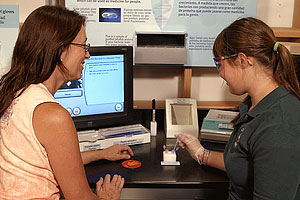 When I think of an amateur biologist, I imagine a bird watcher. Or perhaps someone investigating a stream or counting fish. What I don't think of is people tinkering with life in their garages. And yet some folks are doing just that.
When I think of an amateur biologist, I imagine a bird watcher. Or perhaps someone investigating a stream or counting fish. What I don't think of is people tinkering with life in their garages. And yet some folks are doing just that.
The AP ran a story the other day about people working with DNA in their garages (or apartments). For example, a woman in San Francisco is trying to engineer yogurt bacteria that will glow green in the presence of melamine. This is the chemical that was found in baby formula and pet food from China.
The idea would be that you (or some governmental agency) could check your yogurt with a UV light before you ate it. If it glowed green, then the yogurt was contaminated with melamine.
These glowing bacteria could help a lot of people avoid melamine poisoning (as long as people could get past the fact that they'd be eating a GMO!). But do we really want people doing this kind of biology at home?
Of course this sort of thing would be very difficult to stop. People can go to science fair project sites and get all the information they need to jury rig a lot of the equipment to do these kinds of experiments. They can also search the web or take a class at their local community college and learn most everything they need to know.
